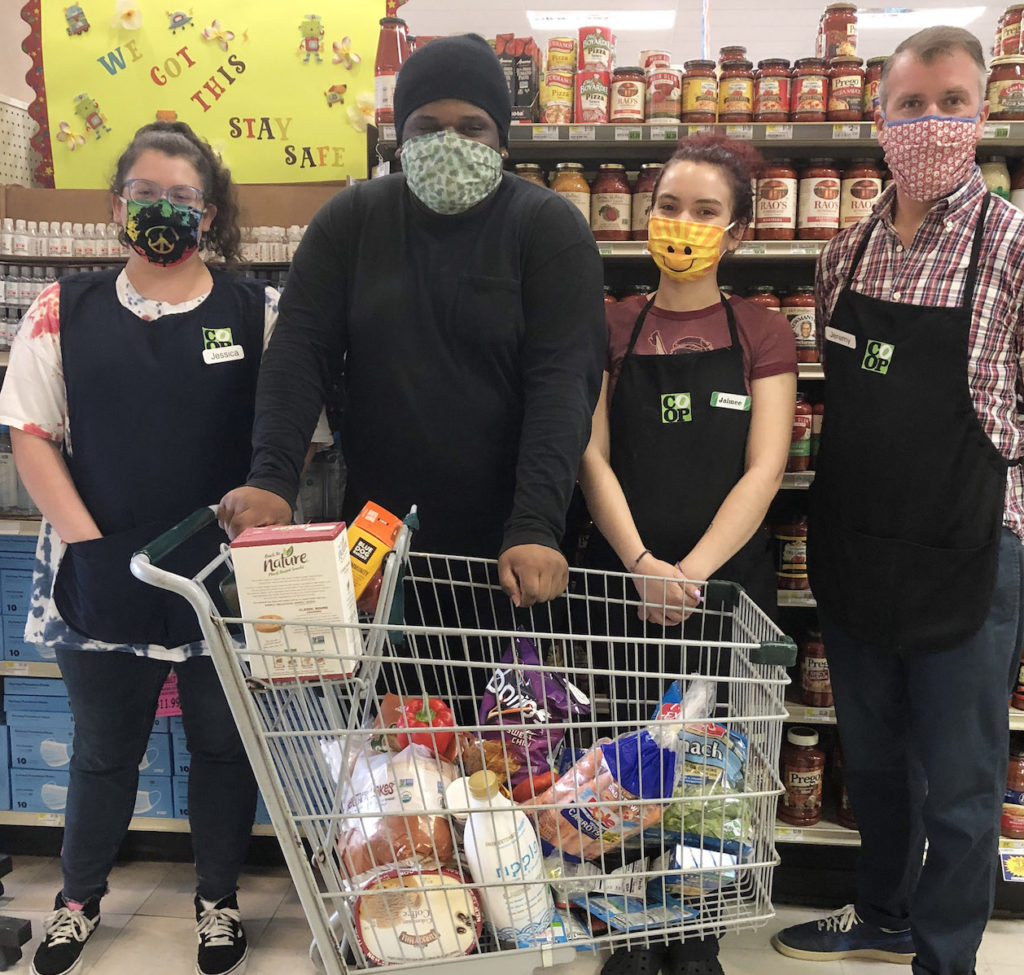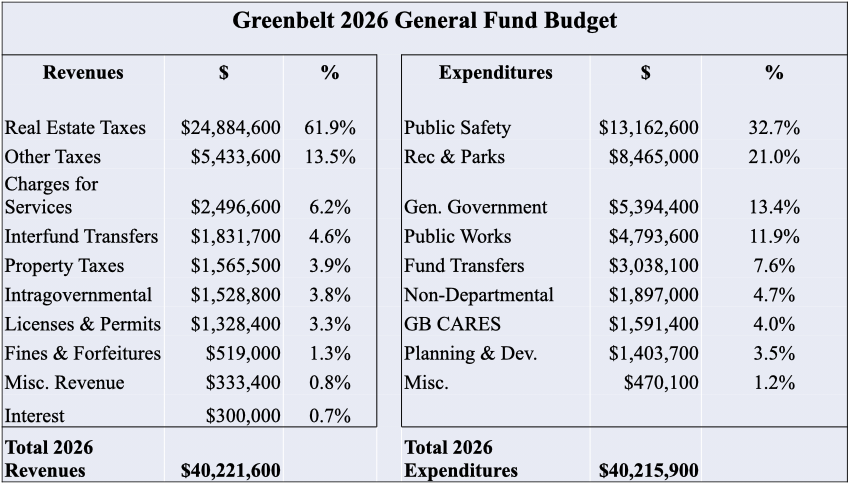At the Annual General Meeting of Greenbelt Consumer Co-operative on November 7, approximately 60 members heard the good news that Co-op, for the first time in three years, had posted a profit. Manager Dan Gillotte was also happy to state that the store had not, through the day of the meeting, had a positive Covid-19 test for an employee – though he worried that he was tempting providence. Alas, so it proved. In a letter to members emailed Tuesday, November 10, Gillotte announced that one employee had tested positive. The employee, whose last shift was November 4, had not had close contact with the public (The Centers for Disease Control defines ‘close contact’ as less than six feet away for a duration of 15 minutes or more). Gillotte, in his letter, said that Co-op was fully supporting the affected individual and that safety continued to be their highest priority.
In the meeting, Gillotte expressed his gratitude to Co-op’s staff, noting that they spend their working day in an environment most are at pains to avoid and lauded their continued vigilance in protecting customers and each other. He was grateful for their welcome to him and his family earlier in the year and for their wholehearted collaboration during these difficult months. Gillotte took on the role of manager the same day masks became compulsory in Maryland.
Thanks to Bob Davis
President Bill Jones called the meeting to order, thanking, as did others, Bob Davis, who retired as manager in April after 37 years of service. Jones welcomed Gillotte as the new manager and thanked Barbara Ford (a past board president), Donna Peterson and Linda Ivy, all of whom are leaving the board after many years of contributions. The meeting unanimously elected three new members: Gettie Audain, Johanna Goderre Jones and Steve Bernheisel. All three are active members of the Greenbelt community and dedicated Co-op shoppers.
In the Black
Treasurer Joe Timer reported that Co-op, after two years of increasing losses, made a substantial profit, with an operating profit of $57K boosted by a one-time rebate of $151K from its supplier to an income before tax figure of approximately $264K. The Paycheck Protection Program loan, which is not a factor in the profit calculation, is being used exactly as required to cover wages and some portion of utilities and other expenses and an application has already been made for forgiveness.
Timer explained that although there are to be no member dividends, there will be employee bonuses, and offered his own kudos to staff who have worked in masks throughout the Covid-19 period, referring to their increased pay as well deserved.
Rays on the Roof
State Liaison Dorrie Bates and Project Manager Steve Skolnik, both volunteers, received praise and gratitude for their roles in pushing the project through to completion. The roof replacement is completed and paid for out of the loans and donations received through the Rays on the Roof campaign.
The solar array is nearing completion but the grant for it has not yet been received from the state. Jones noted that Co-op has funds to complete payment for the solar array, even if the state funding comes in late (both invoice and grant are expected in a matter of weeks). In his report on the project, Skolnik said that the connection to the grid by Pepco is scheduled for mid-December and that power should start flowing from the array shortly thereafter.
Skolnik reiterated the anticipated significant benefits from the project. The R-30-plus insulation in the roof (as much as R-90 in some places due to the drainage slope) reduces overall heating and cooling power needs and the solar array is projected to produce approximately 20 percent of the store’s remaining electricity requirement. Skolnik also mentioned the welcome disappearance of the chronic long-term annual cost for repairs previously necessitated by the constantly leaking roof.
Jones explained that the value of the electricity generated will be noted monthly by Pepco, making it simple to set aside equivalent funds to repay the loans – with an anticipated $10K to $20K surplus available beyond annual loan servicing used to offset operating costs as the loans are paid off. By approximately 2031, with loans repaid, all the savings from the solar installation will be available to offset other costs.
Curbside Pickup
The curbside delivery capability has proven popular, and while not yet quite paying for itself, has provided a much-needed local service. Initiated by Davis, implementation was accelerated by Gillotte on his arrival as the pandemic worsened.
Commenting on shortages, Gillotte noted that the store, as a small independent operation, has the flexibility to be innovative in sourcing. Toilet paper, hand sanitizer, yeast (for home bakers) and masks have been acquired outside normal channels to keep essential supplies available. Gillotte said that in 30 years in the grocery business, he has never seen “the supply chain as wonky as it is” and remarked that “it is challenging to do the normal stuff.”
Greenbelt Buys, Gives
After moving his family here from Texas in April, Gillotte seemed delighted by Greenbelt. “This community is so generous,” he said. He pointed out that more than 5,000 grocery bags ($5 each) of non-perishable items have been donated since March 1 to be distributed by the St. Hugh’s food pantry – representing $25,000 of much-needed staples for struggling families. On overall purchases, he said that members are also buying more groceries per trip. Sales were up dramatically starting in February, overall exceeding those of last fiscal year by close to $1M. Weekly sales for the last 22 weeks of FY20 were 19 percent higher than the same period during FY19. Gillotte encouraged members to keep purchasing at Co-op as life patterns return to normal.
Bylaw Change
Attendees voted to allow a portion of patronage refunds to go into non-interest-bearing accounts (noting that this would not apply immediately, since there have been no such payments for 2020). This brings Greenbelt in line with other co-ops in having two capital accounts pertaining to members: Member Capital, which bears interest (currently 1 percent) and Sustaining Equity which does not pay interest, both of which provide capital for Co-op to use.
There is no change to the pay-out process for interest on Member Capital (interest is paid on accounts with balances over $200) and although the rate of interest has been inched down on that account to 1 percent, rates on Rays on the Roof loans will remain at their original level. This bylaw enables members to donate all or part of their member capital to the sustaining equity account. Member capital is not available to the member but is retained by the Co-op as long as the law allows.
Member questions were relatively few and attendee questions submitted through chat were answered in turn at various stages of the meeting. The meeting didn’t have the lively back and forth of in-person meetings, but it was effectively run and efficient in achieving its goals.




